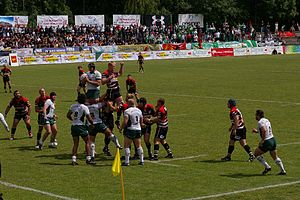Rugby in Poland
| Rugby union in Poland | |
|---|---|

Budowlani Łódź playing Lechia Gdańsk
|
|
| Country | Poland |
| Governing body | Polski Związek Rugby |
| National team | Poland |
| First played | 1922 |
| Registered players | 6,779 |
| Clubs | 74 |
|
National competitions
|
|
|
Club competitions
|
|
Rugby union in Poland is a minor but growing sport.
The Polish Rugby Union (Polski Związek Rugby) was founded in 1957, and joined the IRFB in 1988. The official supplier of equipment to the PRU is O'Brien sport.
An earlier Polish Rugby Union was set up in the early 1920s, but was disbanded in 1928.
In 1921, Louis Amblard, a Frenchman, set up the very first Polish rugby club called "The White Eagles". The first match was in 1922, and the first club international in 1924 against a Romanian side.
The game became established in the Warsaw Military Academy in the early 1930s.
The tragic events of World War II, the Molotov-Ribbentrop Pact etc., meant that the growth of Polish rugby was retarded until the 1950s. During World War II, there were occasional games between allied POWs in German camps in Poland. For example, a game was held between a Scottish and a Welsh XV, in ten inches of snow. No conversions were allowed, as the ball would have gone over the camp fence, and the game was twenty minutes each way. Players wore army boots, trousers, prison shirts and balaclavas.
Polish rugby arguably achieved its greatest success in the late 1970s when the national team beat Italy, Spain and the USSR, and also held Romania to a 37-21 win in 1977.
In 1983, Poland failed to play Italy in the FIRA Championships, and told FIRA that two of their players had died. It is not known where the other died, but one had died near Bucharest.
The Cold War frequently intruded - for example in the 1984 FIRA Championships, in the game against France, Poland demanded the removal of the French players Didier Camberabero, Henri Sanz and the Brive RFC centre Yves Fouget, because as members of the French armed forces, they were considered to be a security risk.
Because of high Polish emigration, particularly to France, and English speaking nations, the Polish team actually has a fairly large pool of potential players. In addition, a number of Poles returning from jobs in the British Isles and France, have carried the game back with them.
...
Wikipedia
